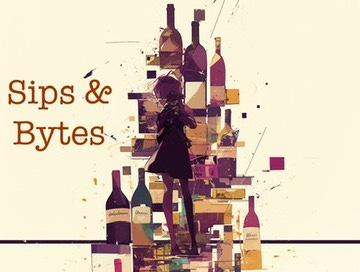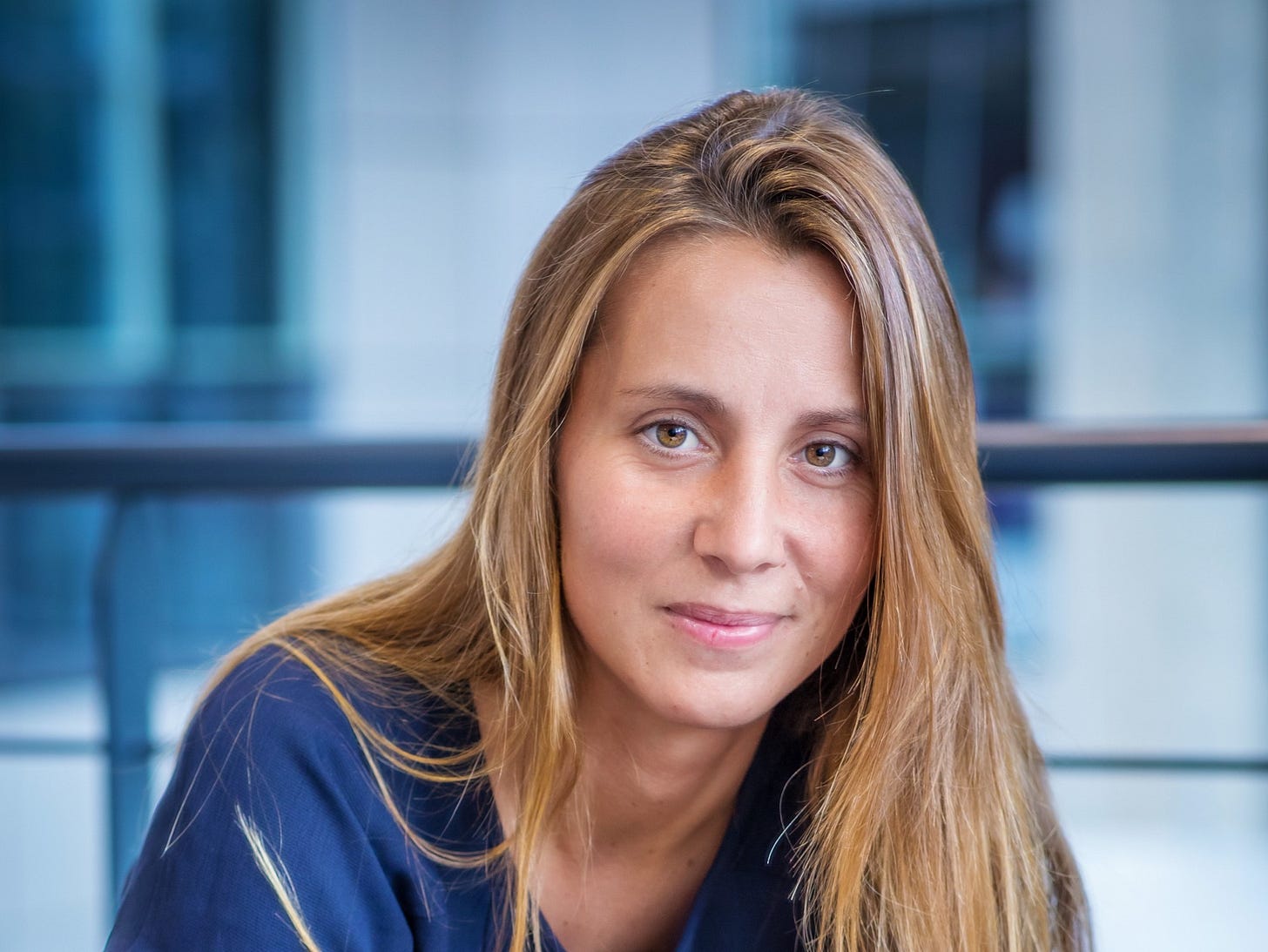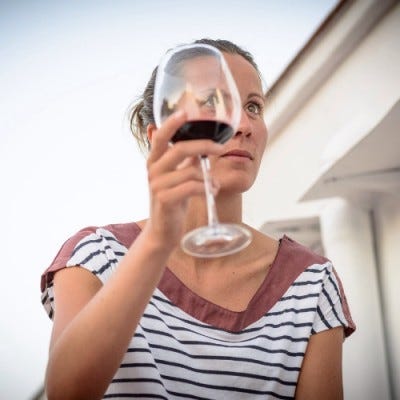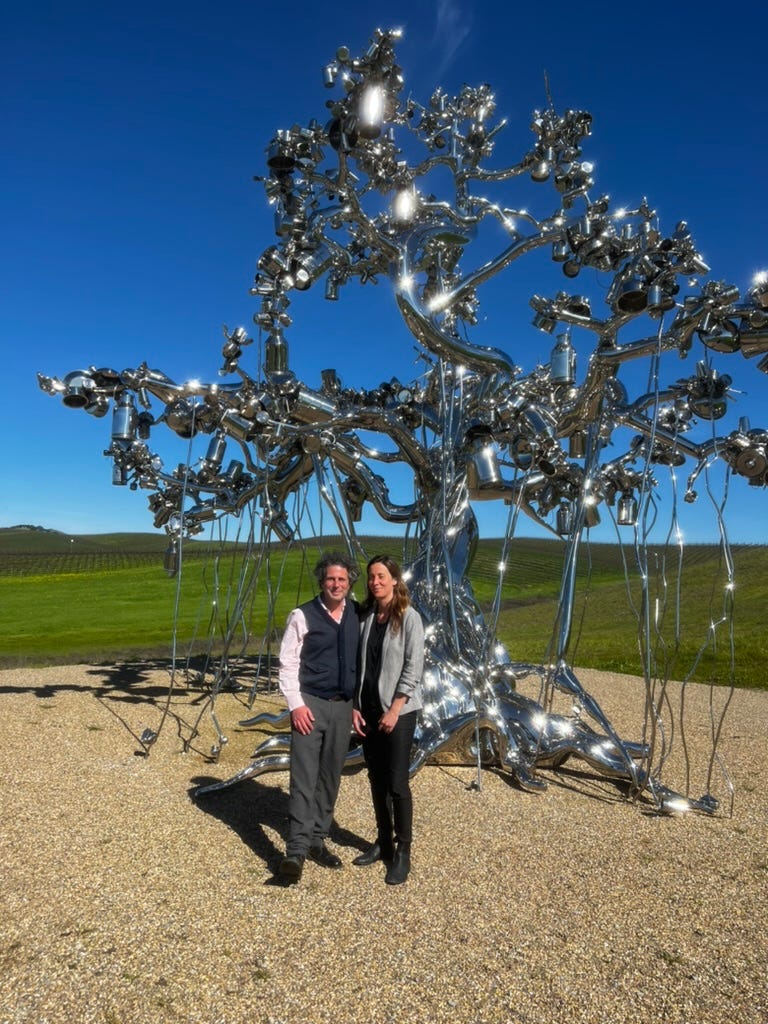Let me introduce Dr. Magalie Dubois. Professor of Wine Economics. It’s easy to see how incredibly smart she is —
A Ph.D. in Economics from the University of Bordeaux studying under Jean Marie Cardebat and Larry Lockshin
A member of the Elite European Association of Wine Economists
A top instructor at the Burgundy School of Wine and Spirits
She speaks three languages, but when you add digital and wine business, she is a true polyglot.
But these are just the highlights. That’s why I featured Magalie on Sips & Bytes — because she’s leading the thinking and research we need in the wine industry for positive change.
Discipline is fundamental for any academic. Patience is crucial for those specializing in the wine business. However, a wine business academic eager to comprehend the digital domain is the rarest of intellectuals and fueled by passion. That recipe makes up Magalie, a disciplined, patient, and passionate scholar and instructor of the wine business. Unlike some academics, she's not just grounded in theory but also in the real-world understanding of applied science, thanks to her eight years of experience as an export manager. This unique blend of academic and real-world experience has honed her wine business knowledge, making her not just someone with fantastical ideas but rooted in real-world problems.
The most impressive people I know and meet all share one quality: intellectual curiosity. It's the defining factor for people who change the world. As perpetual learners, they understand that the only constant is change and that understanding the universe is a forever journey. And that that's Magalie's superpower - intellectual curiosity. When you have a conversation with her, you see the sparkle in her eye as she asks you questions. She finds pearls of inspiration to create new and meaningful research from casual topics in your conversations. You immediately understand why she is one of the elite professors in the world who study the intersection of wine and tech. Magalie always asks all the good questions— the ones that press on preconceived notions and seek new truths. She's not looking for the traditional answers but what makes today work and tomorrow better. She's interested not only in the psychological motivations of consumers but also in new innovative ways to reach them.
I look forward to every conversation with her, as I always leave feeling smarter and more inspired, a testament to the power of her energy, charm, and intellect.
How did you become interested in the intersection of wine and digital tools?
Online review aggregators have been game-changers for wine consumers seeking recommendations. This topic is the focus of my Ph.D. thesis.
Could you share a noteworthy or exciting achievement or project at your company that excites you or is brag-worthy?
My primary goal in life is to continue enjoying amazing wines for many years. As a researcher and wine marketing teacher, I strive to contribute positively to the industry. I initiated a monthly event, "Wine and Vine Expertise Thursdays," at the School of Wine & Spirits Business in Dijon, France. Each month, a local researcher presents their findings on various wine-related topics—such as consumer behavior, sensory sciences, and oenology—for 20 minutes, followed by a 20-minute Q&A session and 20 minutes (sometimes more) of wine sharing related to their research. This event, open to researchers and wine professionals, fosters a connection between research and the industry.
Name three wines you think are wonderful:
Subtil 2018 (Corpinnat Brut Nature) – Recaredo, Penedès, Spain
Sables & Schistes 2018 (Savennières) – Loic Mahé, Loire Valley, France
Marsannay Clos Du Roy 2018 – Sylvain Pataille, Bourgogne, France
Could you share your most memorable recent wine experience?
Recently, I traveled to Tenerife (Canary Islands, Spain), and after five days of hiking, I visited one of the island's most famous restaurants. The sommelier, in a great mood, crafted a unique Canarian wine pairing for me, jokingly saying, "my colleague will be very angry tomorrow morning." This was the most impressive wine pairing I've ever experienced. We concluded the evening with a bottle of wine she selected, joined by the chef, who was also her husband. Time seemed to stop. It was an incredible moment.
In your opinion, what makes the combination of wine and technology extraordinarily challenging?
The fragmented nature of the wine industry, characterized by a predominance of small producers, presents a significant challenge. These producers often lack the necessary resources—be it time, money, or human capital—to fully exploit the potential of digital technologies. This disparity hampers the industry’s overall ability to adapt and thrive in the digital age.
Do you admire any digital companies or initiatives in the wine industry? What sets them apart?
Companies like Winespace, LivEx, and Saturnalia stand out for their innovative approaches to harnessing data and technology. Winespace excels in converting free comments into actionable data, LivEx in providing a comprehensive trading and insights platform for fine wines, and Saturnalia in leveraging satellite imagery for vineyard analysis. Each of these initiatives demonstrates the potential of technology to add value and efficiency across different facets of the wine industry.
What key recommendations would you offer to a winery looking to integrate digital tools into its sales, marketing, or operational strategies?
Wineries should reconceptualize wine not as a unique artifact but as a product within the broader beverage market. This mindset shift is crucial for leveraging digital tools effectively, as it encourages strategies that enhance accessibility, marketability, and consumer engagement in ways that are responsive to contemporary market dynamics.
In your view, what is the most significant obstacle wineries face when leveraging digital tools?
The primary obstacles include cultural resistance, a lack of digital literacy, and the perceived high costs and time investment required for digital adoption. Overcoming these challenges necessitates a comprehensive approach encompassing education, training, and reevaluating digital tools as essential investments for future growth.
What wine do you plan to enjoy next, and is there a specific reason behind your choice?
I am heading to Austria to teach this week. I am a big fan of Riesling, so I am looking forward. If I find the time I would love to visit Alzinger. Hopefully, Klaus Egle will also guide me.
Name one or people you think are digital stars in the wine industry.
I had the pleasure of meeting Alder Yarrow on my last visit to California but didn’t get the opportunity to meet Justin Noland or Peter Jones. I’m also excited to someday put together a roundtable with Robert Joseph, Robin Goldstein, and you and some other leaders to brainstorm innovative ideas for the wine industry. However, what’s most needed in our industry is more female digital leaders.
Next on Sips & Bytes - Andrew Levy, the powerhouse helping change the face of wholesale from analog to digital








What a great interview ! As always with Magalie, we'd love to know more and more...
This is a great point:
"The fragmented nature of the wine industry, characterized by a predominance of small producers, presents a significant challenge. These producers often lack the necessary resources—be it time, money, or human capital—to fully exploit the potential of digital technologies. This disparity hampers the industry’s overall ability to adapt and thrive in the digital age."
But it makes me wonder, do other industries that are highly fragmented also have difficulties adopting new technologies? The other thing that might be a factor is the physical characteristics of wine. It's heavy. Then there's the regulations. But still, I'm wondering about other fragmented industries.